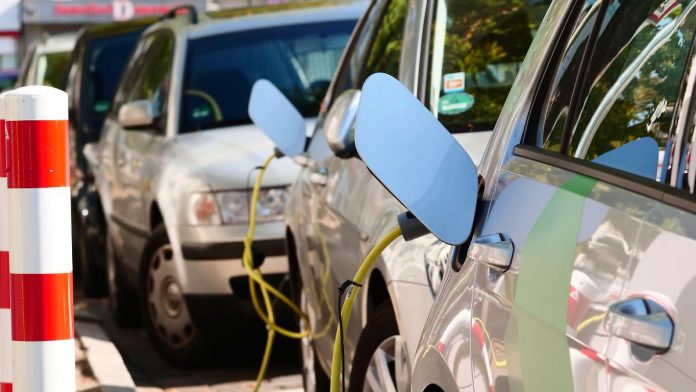“Significant tax incentives”
Federal government wants to promote electric cars as company cars
This audio version was artificially generated. More info | Send feedback
With the end of state funding, demand for electric cars is collapsing. As part of its “growth initiative,” the federal government is aiming to boost sales again. The cabinet is now setting the course for a special depreciation allowance for companies.
The Federal Cabinet has introduced tax relief for electric cars as company cars. A draft bill states that the Federal Government has set itself the goal of significantly advancing electromobility in Germany. “Successfully implementing this goal also requires far-reaching tax measures.” There are no plans to provide direct support for private buyers of electric cars.
Demand for electric cars collapsed after the government stopped subsidizing them. The federal government abruptly ended the so-called environmental bonus in December. The reason was budgetary constraints. In July, the traffic light coalition agreed on a “growth initiative” during budget negotiations. One of the measures is tax incentives for electric cars as company cars.
Specifically, this is what it is about: For companies, a special depreciation allowance for newly registered fully electric and comparable zero-emission vehicles is to be introduced retroactively to July 1, 2024. In addition, the so-called cap on the gross list price for company car taxation for electric vehicles is to be raised from EUR 70,000 to EUR 95,000.
Habeck expects “demand push”
Economics Minister Robert Habeck had already spoken of a boost to increase demand for e-mobility. He expects a “demand push”. Company cars also play an important role in the used car market because they are kept for a comparatively short time.
The draft law states that the planned new measures will provide “significant tax incentives”, particularly for the market ramp-up of electromobility in the business sector. The regulation only covers newly purchased, purely electric vehicles. It is to be introduced for a limited period for purchases in the period from July 2024 to December 2028. “The temporary limitation creates incentives for rapid investment decisions.”
The draft law describes the shortfall in tax revenues for 2024 as minor. In 2025, the shortfall in tax revenues is estimated at 480 million euros, and is expected to rise to 540 million euros by 2028.
Association welcomes project
The Association of the Automotive Industry (VDA) called for a quick parliamentary decision on the tax incentives introduced by the cabinet. VDA President Hildegard Müller called the cabinet decision “an important and correct signal” that was urgently needed, especially in view of the abrupt abolition of the environmental bonus at the end of last year and the currently weaker demand for electric cars. “Now it is important that the Bundestag and Bundesrat quickly decide on the new measures in the parliamentary process,” emphasized Müller. “Lengthy negotiations, delays and a watering down of the package as with the Growth Opportunities Act must be avoided.”
Müller emphasized that the increase in the assessment basis for the reduced company car tax for purely battery-electric vehicles in particular will help to accelerate the ramp-up of e-mobility in Germany. This will also strengthen the used car market for fully electric cars because company cars will be available as used cars at a low price after the leasing period of usually three years has expired. The planned introduction of accelerated depreciation for newly registered fully electric vehicles for companies could also support the ramp-up of electromobility.


